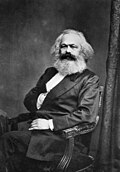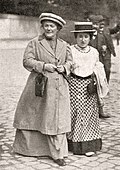
Back بوابة:اشتراكية Arabic دەروازە:سۆشیالیزم CKB Portal:Sosyalizm DIQ Portal:Socialismo Spanish Portail:Socialisme French प्रवेशद्वार:समाजवाद Hindi Portal:Sosialisme ID Portale:Socialismo Italian Portal:Sosyalizm Turkish Portal:社会主义 Chinese
The Socialism portal The socialist political movement includes political philosophies that originated in the revolutionary movements of the mid-to-late 18th century and out of concern for the social problems that socialists associated with capitalism. By the late 19th century, after the work of Karl Marx and his collaborator Friedrich Engels, socialism had come to signify anti-capitalism and advocacy for a post-capitalist system based on some form of social ownership of the means of production. By the early 1920s, communism and social democracy had become the two dominant political tendencies within the international socialist movement, with socialism itself becoming the most influential secular movement of the 20th century. Many socialists also adopted the causes of other social movements, such as feminism, environmentalism, and progressivism. (Full article...) Selected articleIn Marxist theory, socialism, also called the socialist mode of production, refers to a specific historical phase of economic development and its corresponding set of social relations that supersede capitalism in the schema of historical materialism. The Marxist definition of socialism is a mode of production where the sole criterion for production is use-value and therefore the law of value no longer directs economic activity. Marxist production for use is coordinated through conscious economic planning, while distribution of economic output is based on the principle of to each according to his contribution. The social relations of socialism are characterized by the working class effectively owning the means of production and the means of their livelihood, either through cooperative enterprises or by public ownership or private artisanal tools and self-management, so that the social surplus accrues to the working class and society as a whole. This view is consistent with, and helped to inform, early conceptions of socialism where the law of value no longer directs economic activity, and thus monetary relations in the form of exchange-value, profit, interest and wage labor would not operate and apply to Marxist socialism. The Marxian conception of socialism stands in contrast to other early conceptions of socialism, most notably early forms of market socialism based on classical economics such as mutualism and Ricardian socialism. Unlike the Marxian conception, these conceptions of socialism retained commodity exchange (markets) for labor and the means of production, seeking to perfect the market process. The Marxist idea of socialism was also heavily opposed to utopian socialism. Although Karl Marx and Friedrich Engels wrote very little on socialism and neglected to provide any details on how it might be organized, numerous social scientists and neoclassical economists have used Marx's theory as a basis for developing their own models of socialist economic systems. The Marxist view of socialism served as a point of reference during the socialist calculation debate.
Selected biography -Eugene Victor Debs (November 5, 1855 – October 20, 1926) was an American socialist, political activist, trade unionist, one of the founding members of the Industrial Workers of the World (IWW), and five-time candidate of the Socialist Party of America for President of the United States. Through his presidential candidacies as well as his work with labor movements, Debs eventually became one of the best-known socialists living in the United States. Early in his political career, Debs was a member of the Democratic Party. He was elected as a Democrat to the Indiana General Assembly in 1884. After working with several smaller unions, including the Brotherhood of Locomotive Firemen, Debs led his union in a major ten-month strike against the CB&Q Railroad in 1888. Debs was instrumental in the founding of the American Railway Union (ARU), one of the nation's first industrial unions. After workers at the Pullman Palace Car Company organized a wildcat strike over pay cuts in the summer of 1894, Debs signed many into the ARU. He led a boycott by the ARU against handling trains with Pullman cars in what became the nationwide Pullman Strike, affecting most lines west of Detroit and more than 250,000 workers in 27 states. Purportedly to keep the mail running, President Grover Cleveland used the United States Army to break the strike. As a leader of the ARU, Debs was convicted of federal charges for defying a court injunction against the strike and served six months in prison. (Full article...) General imagesThe following are images from various socialism-related articles on Wikipedia.
Did you know (auto-generated) -
Related portalsTopicsSubcategoriesWant to find an article related to socialism? Try browsing through any of the main categories below:
Select [►] to view subcategories
Selected quotation
Participate!Everyone is welcome to participate in WikiProject Socialism, where editors collaborate to improve all aspects related to socialism on Wikipedia. Associated WikimediaThe following Wikimedia Foundation sister projects provide more on this subject:
Discover Wikipedia using portals | ||||||
© MMXXIII Rich X Search. We shall prevail. All rights reserved. Rich X Search



















































